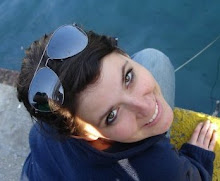Someone once said that love is blind. That someone must have known something very honest about love. I think he knew that love pulls a fast one on us, making us believe one thing but not cluing us into the fact that we may be the only one to see it that way. Maybe it's a little more like a pair of tinted glasses no one else has worn, this thing called love.
Why the focus on love? I am thinking about this because the last 11 or 12 weeks of my life have been colored with a lot of interesting things; things that sometimes makes me forget that I'm a white girl in Africa.
Notice, I seem to be forgetting myself more than anything. Frankly, it’s not very easy to forget you are living in the middle of nowhere in
Like a lot of people who come to a far-off place, I had a vision in my head of what an orphanage looked like and what working there would entail. And in none of those pictures did I see myself or kids having nearly so much fun, so many laughs, so much tickling or play so many games as I have here. I’m willing to admit that some of the…uh…mayhem...could be my fault. Simultaneously a pupil and a victim of my older brother’s torturing methods, I became quite a skilled instigator/actress in what you might call the art of provoking squealish, squirming delight.
But what I have sat down to write regarding Nyumba ya Furaha, The Joyful Home’s fitting KiSwahili name, is when that inner crust shakes every now and again you stop and really look at each child’s heart. You remember that they are not glowing with life because life happened naturally for them. They are here at Nyumba ya Furaha because life happened unnaturally, and they are learning to live and grow up despite the glitch in the universal system of family. Most of the time, though, you just don’t see this sort of sadness or anything to pity about these nine kids, and it isn’t because they have everything in the world. Quite the contrary, they have few things and eat few delicacies. New clothes aren’t new; they are just new to them now that they have been handed off from someone else who bought new clothes for themselves. They don’t go out for pizza on the weekends or have family trips to the movie theatre. On birthdays, they don’t get many gifts or cards with money from distant relatives. On Christmas, sometimes they don’t even go home or have a home to go to.
These are the moments where the thin veneer over happiness becomes a little more transparent, the moments where you feel how from one second to the next an entire one or two or three months of laughter vaporizes. This is when the tinted lenses come off and you see a very different world than the one you’ve lived in. But then, something amazing happens…a few minutes later, you can make them laugh again. You don’t have to put your rose-colored glasses on to tell that they are really happy children with true happiness lighting up their soul just then. But you do have to stop and take some serious stock of what you think about happiness if an orphan in Africa can be happier than you and the kids you know.
Strange though this may seem, I have nothing depressing to tell you about
All happiness may be at the end of the day is a memory. It is remembering that no matter what tints your shades at the moment, life still has value. And of all things happiness never forgets, it's the concept of value.
Take that, TJ.


